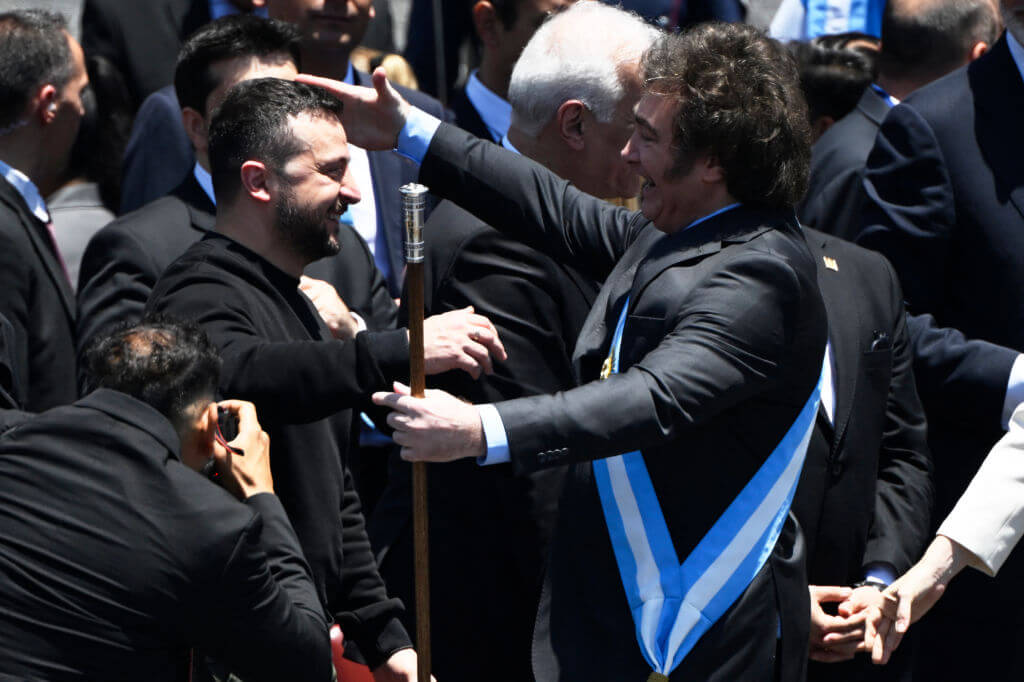Javier Milei cites Hanukkah story, gives menorah to Zelenskyy during inauguration as Argentina’s president
“It is not by chance that this assumption takes place in the holiday of Hanukkah,” the populist leader said during his speech

Argentina’s president Javier Milei, right, is greeted by Ukraine’s President Volodymyr Zelenskyy after delivering his speech before the crowd during an inauguration ceremony at the Congress in Buenos Aires on December 10, 2023. Photo by Getty Images
(JTA) — Javier Milei invoked the story of the Maccabees in his inaugural address as Argentina’s president on Sunday, extending the right-wing populist’s prominent fascination with Judaism as he celebrated his own improbable victory.
“It is not by chance that this assumption takes place in the holiday of Hanukkah, the festival of light, and that the same celebrates the true essence of freedom,” Milei said during his speech on the steps of the parliament building in Buenos Aires. “The war of the Maccabees is the symbol of the victory of the weak over the powerful, of the few over the many, of the light over darkness and overall of the truth over untruth.”
Milei, 53, defied expectations when he was elected last month. A self-declared “anarcho-capitalist” who was the most right-wing of the five candidates, he ascended rapidly over the last year as he assailed the outgoing government, saying that its policies had fueled unemployment and inflation.
He delivered his speech with his back to the country’s lawmakers, in a break with tradition allowing him to face a large rally outside the parliament building.
Toward the tail of his speech warning Argentineans to prepare for a difficult economic reforms, he said he recalled how he and his now-vice president, Victoria Villaruel, had initially been told that their two-year-old political party, Freedom Advances, would have little influence.
“We were told we couldn’t do anything because we were only two in 257 congressmen,” he said. “And I also remember that my answer that day was a quote from the Book of Maccabees, 3:19, that goes: It is not the size of the army that victory in battle depends on, but strength comes from heaven.”
The speech was in keeping with Milei’s unusual relationship with Judaism. The non-Jewish economist has been studying with an Argentinean rabbi and has said he is interested in converting, though he says he does not see the role of president as compatible with Jewish observance. He visited the grave of the Chabad-Lubavitch rabbi in New York City in his first trip abroad after being elected and has vowed to make Israel — where he promised to move Argentina’s embassy from Tel Aviv to Jerusalem — his first foreign destination as president.
At campaign rallies, Milei has often walked on stage to the sound of a shofar, and in one of his final public appearances before the election, Milei was seen waving an Israeli flag among a large crowd in Rosario.
One Israeli flag was visible amid the sea of Argentinean flags at his speech in footage of the inaugural event broadcast to Argentineans.
Milei, whose term will last four years, was flanked by world leaders, including the king of Spain; Chilean President Gabriel Boric, a left-wing critic of Israel; Hungarian Prime Minister Viktor Orban, a populist who cruised to a fourth term last year; and Ukraine’s president, Volodymr Zelenskyy, who was making his first trip to Latin America since Russia attacked his country in February 2022. Jair Bolsonaro, the populist leader recently unseated in Brazil, also attended.
Milei handed a menorah to Zelenskyy, who is Jewish, after the two leaders greeted each other warmly outside Casa Rosada, the country’s government headquarters, in a handoff captured on the live TV broadcast of the ceremony. Zelenskyy has embraced Milei as he has sought to build support for Ukraine in Latin America.
On Saturday night, on the eve of his inauguration, Milei met with a group of relatives of Israeli hostages kidnapped in Gaza since Oct. 7, lighting the Hanukkah candles with them and Israeli Foreign Minister Eli Cohen, who was in the country for the inauguration.
This article originally appeared on JTA.org.















